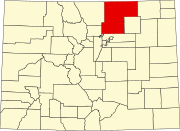Fort Lupton High School
History
The city was named for Lieutenant Lancaster Lupton, who built a trading post on Adobe Creek in 1838. The trading post, Fort Lupton, has been reconstructed near the site of the original fort using some of the original adobe bricks at the South Platte Valley Historical Park, which was established by the South Platte Valley Historical Society northwest of the city of Fort Lupton. It is a historical park about early area settlement.
Geography
The city of Fort Lupton is located at 40°5′N 104°48′W / 40.083°N 104.800°W (40.0849, -104.8030).
At the 2020 United States Census, the town had a total area of 7,808 acres (31.596 km) including 34 acres (0.137 km) of water.
Demographics
| Census | Pop. | Note | %± |
|---|---|---|---|
| 1890 | 113 | — | |
| 1900 | 214 | 89.4% | |
| 1910 | 614 | 186.9% | |
| 1920 | 1,014 | 65.1% | |
| 1930 | 1,578 | 55.6% | |
| 1940 | 1,692 | 7.2% | |
| 1950 | 1,907 | 12.7% | |
| 1960 | 2,194 | 15.0% | |
| 1970 | 2,489 | 13.4% | |
| 1980 | 4,251 | 70.8% | |
| 1990 | 5,159 | 21.4% | |
| 2000 | 6,787 | 31.6% | |
| 2010 | 7,377 | 8.7% | |
| 2020 | 7,955 | 7.8% | |
| U.S. Decennial Census | |||
As of the census of 2000, there were 6,787 people, 2,099 households, and 1,677 families residing in the city. The population density was 1,707.2 inhabitants per square mile (659.2/km). There were 2,132 housing units at an average density of 536.3 per square mile (207.1/km). The racial makeup of the city was 70.34% White, 0.43% African American, 1.36% Native American, 0.83% Asian, 0.03% Pacific Islander, 22.65% from other races, and 4.38% from two or more races. Hispanic or Latino of any race were 47.38% of the population.
There were 2,099 households, out of which 48.2% had children under the age of 18 living with them, 61.0% were married couples living together, 13.1% had a female householder with no husband present, and 20.1% were non-families. 16.9% of all households were made up of individuals, and 6.4% had someone living alone who was 65 years of age or older. The average household size was 3.23 and the average family size was 3.62.
In the city, the population was spread out, with 34.4% under the age of 18, 10.4% from 18 to 24, 30.9% from 25 to 44, 17.7% from 45 to 64, and 6.6% who were 65 years of age or older. The median age was 29 years. For every 100 females, there were 103.9 males. For every 100 females age 18 and over, there were 100.6 males.
The median income for a household in the city was $40,917, and the median income for a family was $45,348. Males had a median income of $34,368 versus $23,849 for females. The per capita income for the city was $15,649. About 11.3% of families and 13.3% of the population were below the poverty line, including 15.3% of those under age 18 and 17.2% of those age 65 or over.
Education
Fort Lupton is part of Weld County Public School District RE-8, which includes Fort Lupton Middle School Fort Lupton High School, Butler Elementary, Twombly Elementary, Little Trappers Preschool, and Kenneth Homyak PK-8. As of 2013, Fort Lupton High School had 560 students in grades 9-12. A controversy arose at the high school in September 2013 when a group of parents sought to remove the novel Looking for Alaska, the 2006 Michael L. Printz Award winner by John Green from the school's curriculum.
Notable people
- Brian Shaw, leading American strongman, placed first in the 2011, 2013, 2015, and 2016 World's Strongest Man.
- John Naka, Japanese-America bonsai grandmaster, was born in and spent his first eight years there.
See also
- Colorado
- List of counties in Colorado
- List of municipalities in Colorado
- List of places in Colorado
- List of statistical areas in Colorado
References
- ^ "Active Colorado Municipalities". Colorado Department of Local Affairs. Retrieved October 18, 2021.
- ^ "Decennial Census P.L. 94-171 Redistricting Data". United States Census Bureau, United States Department of Commerce. August 12, 2021. Retrieved September 10, 2021.
- ^ "Profile for Fort Lupton, Colorado". ePodunk. Retrieved June 15, 2010.
- ^ Gannett, Henry (1905). The Origin of Certain Place Names in the United States. Govt. Print. Off. pp. 129.
- ^ "The New Fort Lupton Rises On The Banks Of The South Platte River". CBS Denver. September 4, 2011. Retrieved June 7, 2018.
- ^ "South Platte Valley Historical Society Home Page". South Platte Valley Historical Society. Retrieved June 7, 2018.
Since there will likely be a currency issue with the home page: 'The South Platte Valley Historical Society has a mission to preserve the history of the South Platte Valley area. The Society is creating a one-hundred acre history park on the north side of Fort Lupton with facilities dedicated to education and historic interpretation... Visit the Society's South Platte Valley Historical Park - Lupton's Fort and the South Platte Valley Settlement... Northwest of the city of Fort Lupton off of Highway 85. The historical park is 1/4 mile West of Highway 85 off of County Road 141/2. Turn right onto Historic Park Way.'
- ^ "US Gazetteer files: 2010, 2000, and 1990". United States Census Bureau. February 12, 2011. Retrieved April 23, 2011.
- ^ "U.S. Census website". United States Census Bureau. Retrieved January 31, 2008.
- ^ (September 18, 2013). Weld Re-8 Schools to break ground on Fort Lupton Middle School remodeling, Fort Lupton Press
- ^ About the School (Fort Lupton High School), Weld-8 School District, Retrieved October 1, 2013
- ^ (October 1, 2013). Looking for Alaska Challenged at Fort Lupton High School, fishingboatproceeds, Retrieved October 1, 2013
